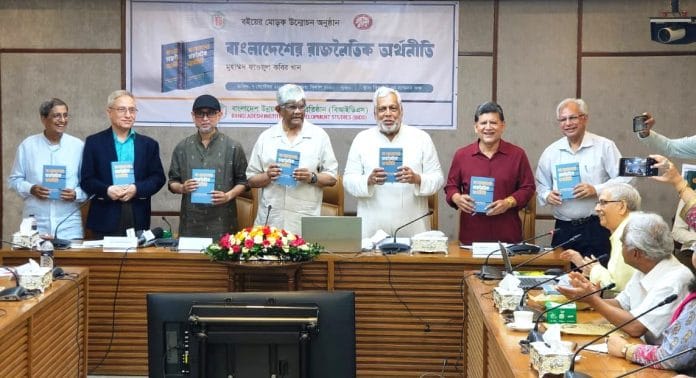Bangladesh’s path to lasting progress depends on unity, good governance, and the continuation of much-needed reforms, Finance Adviser Dr Salehuddin Ahmed said on Sunday, as he urged collective effort to build a better future for the next generation.
Speaking at the launch of “Bangladesher Rajnoitik Orthoniti”, a book authored by Dr Muhammad Fouzul Kabir Khan, adviser to several key ministries, Dr Salehuddin emphasized the importance of values, integrity, and long-term thinking in policy making.
“We are trying our best to improve the country’s condition. I humbly seek cooperation and blessings from all so that this government can contribute to shaping a better Bangladesh,” he said at the event hosted by the Bangladesh Institute of Development Studies (BIDS).
Moderated by BIDS Director General Dr A.K. Enamul Haque, the event featured remarks from prominent advisers, economists, and civil society figures, all of whom echoed the urgent need for political commitment and institutional reform.
Dr Salehuddin acknowledged that while the economy has shown resilience, progress is often undermined by persistent corruption and short-term thinking.
“Bangladesh has come a long way despite many challenges,” he said, adding: “But without addressing corruption and inefficiency, we will continue to fall short of our potential.”
He expressed hope that future governments would carry forward the reform efforts initiated by the interim government and remain committed to transparency and public interest.
Calls for Reform and Continuity
Adviser Syeda Rizwana Hasan, who leads the Ministry of Environment, Forests and Climate Change, cautioned that while sweeping reforms may not be possible within a short interim period, starting the process is crucial. She warned that without political and institutional stability, recent gains could be lost.
Dr Muhammad Fouzul Kabir Khan, author of the book and adviser to the ministries of Power, Energy and Mineral Resources; Road Transport and Bridges; and Railways, revealed that Tk 45,000 crore had been cut from project allocations in these ministries. He highlighted that the previous regime oversaw large-scale corruption, which is now being addressed through tighter controls.
“There is now no ‘deal before the deal,’” he said, emphasizing the importance of competition and transparency in government procurement.
Adviser Mostafa Sarwar Farooqi also pointed to the need for ethical practices in public finance, saying that economic reform must go hand-in-hand with political accountability.
Economists Urge Focus on Fundamentals
Several leading economists joined the discussion, raising concerns about structural challenges that need urgent attention.
Dr Hossain Zillur Rahman, Executive Chairman of Power and Participation Research Centre (PPRC), said the country was suffering from a “corruption syndrome” and stressed the importance of clean governance and credible elections.
Dr Zahid Hussain, former World Bank economist, highlighted issues in the banking sector, energy shortages, inefficient port operations, and the high cost of doing business. He emphasized that policy responses must be well-targeted and consistent to create a stable investment environment.
Renowned environmental expert Dr Ainun Nishat also spoke at the event, underlining the importance of sustainable development.
In closing, Dr Salehuddin reminded the audience that the country’s progress cannot rely on government alone.“It takes collective responsibility and a positive mindset to move forward,” he said.
“We need to stop focusing only on what’s missing — and start building on what we’ve achieved.”

